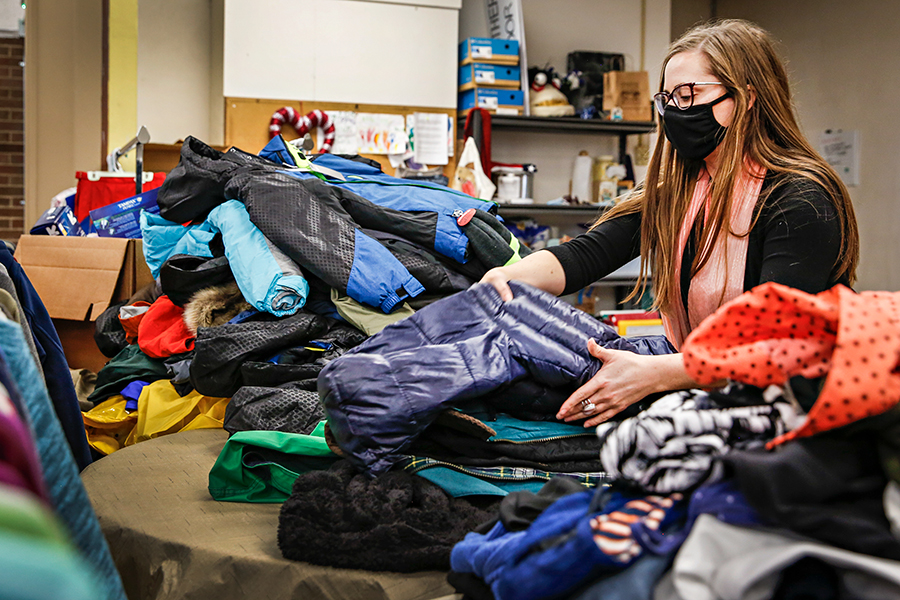A Higher Need for Nonprofits
The pandemic has added more barriers for individuals struggling with homelessness, mental health issues and more as nonprofits try to meet the demand
By Maggie Dresser
As cold winter weather continues in the Flathead, which causes hardships for many residents in the valley during normal times, the pandemic is adding extra obstacles for parts of the population who are seeking shelter, stability and general help.
With limitations on public facilities and in-person services, Tonya Horn, the executive director at the Flathead Warming Center, says many homeless people are out in the cold with nowhere to go.
“There’s nowhere for folks to go during the day,” Horn said. “A lot of services that used to be open to them during the day have limited hours or they’re closed.”
Public facilities like ImagineIF Libraries now have limited hours to mitigate COVID-19 spread, with the Kalispell library location operating Monday through Saturday from 10 a.m. to 3 p.m. The Salvation Army in Kalispell is offering only curbside services and showers by appointment.
The Flathead Warming Center opened a temporary facility on Nov. 20 in Faith Lutheran Church’s gymnasium in Kalispell, which fits 35 beds with COVID-19 restrictions. The nonprofit recently purchased a permanent facility on North Meridian Street in Kalispell, which will hold 40 beds with hopes to open by the end of the year.
After talking to health care workers and law enforcement officials, who often interact with the homeless population, Horn says there seems to be a higher demand for shelter this season amid the pandemic.
“I just received a call yesterday from someone who wasn’t able to get into another shelter,” Horn said. “He called and explained that he’s getting evicted and would need the services of the warming center. He talked about COVID being a primary factor … he was two months behind on rent.”
At the Abbie Shelter, Executive Director Hilary Shaw is also noticing more people struggling with homelessness and overall problems with mental health.
“Anyone who didn’t have enough resources prior to the pandemic, their crisis is heightened and they can’t access the tools they need to cope,” Shaw said. “Everything is just worse. It becomes another one of those things that will soon reach a breaking point for that population.”
Shaw is also noticing heightened anxiety, depression and untreated mental health issues, which all pose barriers to finding employment and financial stability.
With a spike in emergency helpline calls, Shaw says there’s an increase in individuals who are in a “deeper crisis.” There was an uptick in calls this summer, with 133 in June and 132 in July, which Shaw says is unusual. There were 90 calls in March and 98 calls in October. Shaw has noticed a reoccurring trend of addiction, mental health, homelessness and domestic violence.
“When you have those four things in combination, that’s what we’re seeing a lot of,” Shaw said. “Their needs are so hard to meet and their cases are so complex. They need attention and care that very few agencies offer.”
While Shaw emphasizes there aren’t necessarily more abusers due to the pandemic, she says existing abusers’ behavior is escalating.
“Pandemics don’t make abusers,” Shaw said. “You don’t become abusive because of stress. You were already abusive.”
The pandemic has shifted services remotely at the Abbie Shelter, with 90% of mental health services now using telehealth and legal advocacy done mostly over the phone. Shaw says the biggest challenge has been using more hotels than normal to house individuals to prevent a shelter outbreak, which is expensive for the nonprofit.
Other nonprofits in the valley are struggling to provide equally effective services after adapting to pandemic precautions. At the HEART Program, a service for teenagers in the valley, Director Nichole Heyer says COVID has created significant barriers.
Normally, the HEART Program operates with an open-door policy so kids and families can come and go as they please. Now, Heyer is using an appointment-based model to help mitigate the virus, but many teens either won’t schedule an appointment, and if they do, many don’t show up.
“It’s significantly hindering,” Heyer said. “Teens don’t do well with setting an appointment.”
Heyer says there isn’t necessarily a higher demand for the HEART Program’s services, but she’s been forced to limit many programs, which includes art therapy, pizza on Tuesdays and general social gatherings that attract the kids.
“It’s hard to do social work when you can’t really be social,” Heyer said.
While it’s difficult to operate at the HEART Locker facility, Heyer has markets with food and student supplies set up at the Flathead High School and Linderman Education Center, and she’s noticed a higher demand so far this school year. To meet the need, the program recently purchased a sealing machine for its food service and plans to seal leftovers at the facility to create tray dinners to deliver to the markets for students.
Another barrier for HEART program families, which has become especially apparent in recent months, is a lack of affordable housing in the valley.
“We used to see a lot more movement in the marketplace,” Heyer said. “Young families, single moms going through a divorce or single dads used to be able to get into these stepping-stone living situations. People are just parked and there isn’t movement in the market. COVID and housing prices are just so out of control. There’s nothing affordable, period.”
In the meantime, the HEART Program is making do with pandemic limitations, but Heyer can’t offer everything that families and individuals need.
“The program is working, but it’s not quite as joyful as years past,” Heyer said. “The Locker is this crazy, cool square of earth for people in need, and there’s just not enough laughter and energy in the building. We miss that part.”
For more information, visit www.kalispellheartprogram.org, www.flatheadwarmingcenter.org and www.abbieshelter.org. For the Abbie Shelter helpline, call (406) 752-7273.